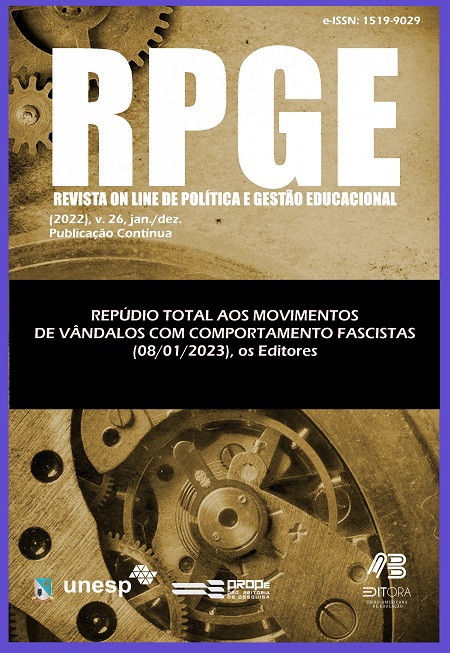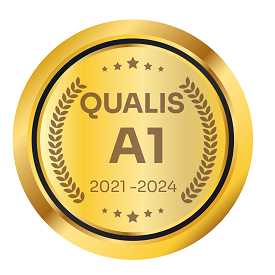Tendencias en la investigación en aprendizaje digital basado en juegos
Análisis bibliométrico (2001-2021)
DOI:
https://doi.org/10.22633/rpge.v26i00.17726Palabras clave:
Aprendizaje basado en juegos digitales, Bibliometria, Tendencias de investigaciónResumen
El objetivo de esta investigación es revelar la dinámica de investigación global de los estudios de aprendizaje basados en juegos digitales y contribuir a una comprensión holística del área temática. Dentro de este propósito, se examina con una perspectiva profunda la situación actual del campo, con sus nuevas orientaciones emergentes y su estructura intelectual. Se realizó análisis bibliométrico y análisis de redes sociales en 494 publicaciones publicadas entre 2001-2021. Como resultado del análisis, las publicaciones en el campo se observaron por primera vez en la base de datos WoS en 2001; se ha determinado que las publicaciones han tenido una tendencia creciente a partir del período 2006-2010. En el análisis de palabras clave comunes, se vio que los conceptos destacados eran "aprendizaje basado en juegos digitales" y "juegos serios". Se encontró que los estudios fueron realizados principalmente por investigadores de Taiwán y EE. UU.
Descargas
Citas
ABT, C.C. Serious Games. Viking Press, New York. 1987.
AGBO, F. J.; SANUSI, I. T.; OYELERE, S. S.; SUHONEN, J. Application of virtual reality in computer science education: A systemic review based on bibliometric and content analysis methods. Education Sciences, v. 11, n. 3, p. 142, 2021.
AL, U.; COŞTUR, R. Bibliometric profile of Turkish Journal of Psychology. Turkish Librarianship, v. 21, n. 2, p. 142-163, 2007.
BHATTACHARYA, S.; KUMAR, R.; SINGH, S. Capturing the salient aspects of IoT research: A social network analysis. Scientometrics, v. 125, n. 1, p. 361-384, 2020.
BORNMANN, L.; MUTZ, R. Growth rates of modern science: A bibliometric analysis based on the number of publications and cited references. Journal of the Association for Information Science and Technology, v. 66, n. 11, p. 2215-2222, 2015.
BRITTAIN, J. M. A highly visible scientist-Jack Meadows. Journal of Information Science, v. 26, n. 4, p. 267-272, 2000.
CHANG, C. Y.; HWANG, G. J. Trends in digital game-based learning in the mobile era: a systematic review of journal publications from 2007 to 2016. International Journal of Mobile Learning and Organisation, v. 13, n. 1, p. 68-90, 2019.
CHAO, C. C.; YANG, J. M.; JEN, W. Y. Determining technology trends and forecasts of RFID by a historical review and bibliometric analysis from 1991 to 2005. Technovation, v. 27, n. 5, p. 268-279, 2007.
CHEN, M. R. A.; HWANG, G. J. Effects of a concept mapping‐based flipped learning approach on EFL students’ English speaking performance, critical thinking awareness and speaking anxiety. British Journal of Educational Technology, v. 51, n. 3, p. 817-834, 2020.
CHEN, P. Y. et al. Three decades of game-based learning in science and mathematics education: an integrated bibliometric analysis and systematic review. Journal of Computers in Education, p. 1-22. 2021.
CHEN, X. et al. Affective states in digital game-based learning: Thematic evolution and social network analysis. PloS one, v. 16, n. 7, e0255184, 2021.
CHIU, Y. H.; KAO, C. W.; REYNOLDS, B. L. The relative effectiveness of digital game‐based learning types in English as a foreign language setting: A meta‐analysis. British Journal of Educational Technology, v. 43, n. 4, p. e104-e107, 2012.
CRANE, D. Invisible colleges: Diffusion of knowledge in scientific communities. Chicago: University of Chicago Press, 1972.
DAI, C.; TAI, Z.; NI, S. Smartphone use and psychological well-being among college students in China: A qualitative assessment. Frontiers in Psychology, v. 12, p. 1-13, 2021.
DONTHU, N.; KUMAR, S.; PATTNAIK, D. Forty-five years of journal of business research: a bibliometric analysis. Journal of Business Research, v. 109, p. 1-14, 2020.
ELLEGAARD, O.; WALLIN, J. A. The bibliometric analysis of scholarly production: How great is the impact. Scientometrics, v. 105, n. 3, p. 1809-1831, 2015.
GLÄNZEL, W.; SCHUBERT, A. Analysing scientific networks through co-authorship. In: Handbook of quantitative science and technology research, Springer, Dordrecht. p. 257-276, 2004.
GROS, B. Digital games in education: The design of games-based learning environments. Journal of Research on Technology in Education, v. 40, n. 1, p. 23-38, 2007.
GURAN, A. M.; COJOCAR, G. S.; DIOŞAN, L. S. Developing smart edutainment for preschoolers: A multidisciplinary approach. In: INTERNATIONAL WORKSHOP ON EDUCATION THROUGH ADVANCED SOFTWARE ENGINEERING AND ARTIFICIAL INTELLIGENCE, 2., 2020. Proceedings […]. 2020. p. 20-26.
HALLINGER, P.; KOVAČEVIĆ, J. A bibliometric review of research on educational administration: Science mapping the literature, 1960 to 2018. Review of Educational Research, v. 89, n. 3, p. 335-369, 2019.
HALLINGER, P.; WANG, R. Analyzing the intellectual structure of research on simulation-based learning in management education, 1960–2019: A bibliometric review. The International Journal of Management Education, v. 18, n. 3, 100418, 2020.
HUANG, P. S. et al. Cooperative mobile learning for the investigation of natural science courses in elementary schools. Sustainability, v. 12, n. 16, p. 6606, 2020.
HUNG, C. M.; HUANG, I.; HWANG, G. J. Effects of digital game-based learning on students’ self-efficacy, motivation, anxiety, and achievements in learning mathematics. Journal of Computers in Education, v. 1, n. 2, p. 151-166, 2014.
HWANG, G. J.; CHEN, P. Y. Interweaving gaming and educational technologies: Clustering and forecasting the trends of game-based learning research by bibliometric and visual analysis. Entertainment Computing, v. 40, p. 1-11. 2021.
HWANG, G. J.; CHIU, L. Y.; CHEN, C. H. A contextual game-based learning approach to improving students' inquiry-based learning performance in social studies courses. Computers; Education, v. 81, p. 13-25, 2015.
HWANG, G. J. et al. Effects of an augmented reality-based educational game on students' learning achievements and attitudes in real-world observations. Interactive Learning Environments, v. 24, n. 8, p. 1895-1906, 2016.
HWANG, G. J.; YANG, L. H.; WANG, S. Y. A concept map-embedded educational computer game for improving students' learning performance in natural science courses. Computers; Education, v. 69, p. 121-130, 2013.
KARAGÖZ, B.; ŞEREF, I. A holistic approach to PhD theses in Turkish Language education (1995-2020). Selcuk University Journal of Faculty of Letters, v. 46, p. 43-68, 2021.
KEVORK, E. K.; VRECHOPOULOS, A. P. CRM literature: conceptual and functional insights by keyword analysis. Marketing Intelligence; Planning, v. 27, n. 1, p. 48-85, 2009.
KIRRIEMUIR, J.; MCFARLANE, A. Report 8: Literature review in games and learning. Futurelab Series, p. 1-35, 2004.
LIU, P. L. Using eye tracking to understand learners' reading process through the concept-mapping learning strategy. Computers; Education, v. 78, p. 237-249, 2014.
MARTÍ‐PARREÑO, J.; MÉNDEZ‐IBÁÑEZ, E.; ALONSO‐ARROYO, A. The use of gamification in education: A bibliometric and text mining analysis. Journal of Computer Assisted Learning, v. 32, n. 6, p. 663-676, 2016.
MILOVANOVIĆ, S. et al. An approach to identify user preferences based on social network analysis. Future Generation Computer Systems, v. 93, p. 121-129, 2019.
MOHER, D. et al. Preferred reporting items for systematic review and meta-analysis protocols (PRISMA-P) 2015 statement. Systematic Reviews, v. 4, n. 1, p. 1-9, 2015.
PRENSKY, M. Digital natives, digital immigrants. On the Horizon, v. 9, n. 5, p. 1–6, 2001.
PRITCHARD, A. Statistical bibliography or bibliometrics. Journal of Documentation, v. 25, n. 4, p. 348-349, 1969.
SCHÖBEL, S.; SAQR, M.; JANSON, A. Two decades of game concepts in digital learning environments: A bibliometric study and research agenda. Computers; Education, v. 173, 104296, 2021.
SHIAU, W. L.; DWIVEDI, Y. K.; YANG, H. S. Co-citation and cluster analyses of extant literature on social networks. International Journal of Information Management, v. 37, n. 5, p. 390-399, 2017.
SHUKLA, A. K. India - stop looking down on international collaborations. Nature, v. 600, p. 361, 2021.
SOLER COSTA, R. et al. How to teach pre-service teachers to make a didactic program? The collaborative learning associated with mobile devices. Sustainability, v. 12, n. 9, p. 3755, 2020.
SUNG, H. Y.; HWANG, G. J.; YEN, Y. F. Development of a contextual decision-making game for improving students' learning performance in a health education course. Computers; Education, v. 82, p. 179-190, 2015.
SWACHA, J. State of research on gamification in education: A bibliometric survey. Education Sciences, v. 11, n. 2, p. 69, 2021.
TAO, J.; TAN, T. Affective computing: A review. In: INTERNATIONAL CONFERENCE ON AFFECTIVE COMPUTING AND INTELLIGENT INTERACTION, 2005. Proceedings […]. Springer, Berlin, Heidelberg, 2005. p. 981-995.
USHER, M.; BARAK, M.; HAICK, H. Online vs. on-campus higher education: Exploring innovation in students' self-reports and students' learning products. Thinking Skills and Creativity, v. 42, 100965, 2021.
WHITE, H. D.; MCCAIN, K. W. Visualizing a discipline: An author co‐citation analysis of information science, 1972–1995. Journal of the American Society for Information Science, v. 49, n. 4, p. 327-355, 1998.
WHITTON, N. Game engagement theory and adult learning. Simulation; Gaming, v. 42, n. 5, p. 596-609, 2011.
YU, D.; HE, X. A bibliometric study for DEA applied to energy efficiency: Trends and future challenges. Applied Energy, v. 268, 115048, 2020.
ZHANG, R.; CHENG, G.; CHEN, X. Game-based self-regulated language learning: Theoretical analysis and bibliometrics. Plos one, v. 15, n. 12, e0243827, 2020.
ZIN, N.A.M.; JAAFAR, A.; YUE, W.S. Digital game-based learning (DGBL) model and development methodology for teaching history. WSEAS Transactions on Computers, v. 8, n. 2, p. 322-333, 2009.
ZUPIC, I.; ČATER, T. Bibliometric methods in management and organization. Organizational Research Methods, v. 18, n. 3, p. 429-472, 2015.
ZYDA, M. From visual simulation to virtual reality to games. Computer, v. 38, n. 9, p. 25-32, 2005.
Descargas
Publicado
Cómo citar
Número
Sección
Licencia
Derechos de autor 2022 Revista on line de Política e Gestão Educacional

Esta obra está bajo una licencia internacional Creative Commons Atribución-NoComercial-CompartirIgual 4.0.
Manuscritos aceitos e publicados são de propriedade da Revista on line de Política e Gestão Educacional. É vedada a submissão integral ou parcial do manuscrito a qualquer outro periódico. A responsabilidade do conteúdo dos artigos é exclusiva dos autores. É vedada a tradução para outro idioma sem a autorização escrita do Editor ouvida a Comissão Editorial Científica.











